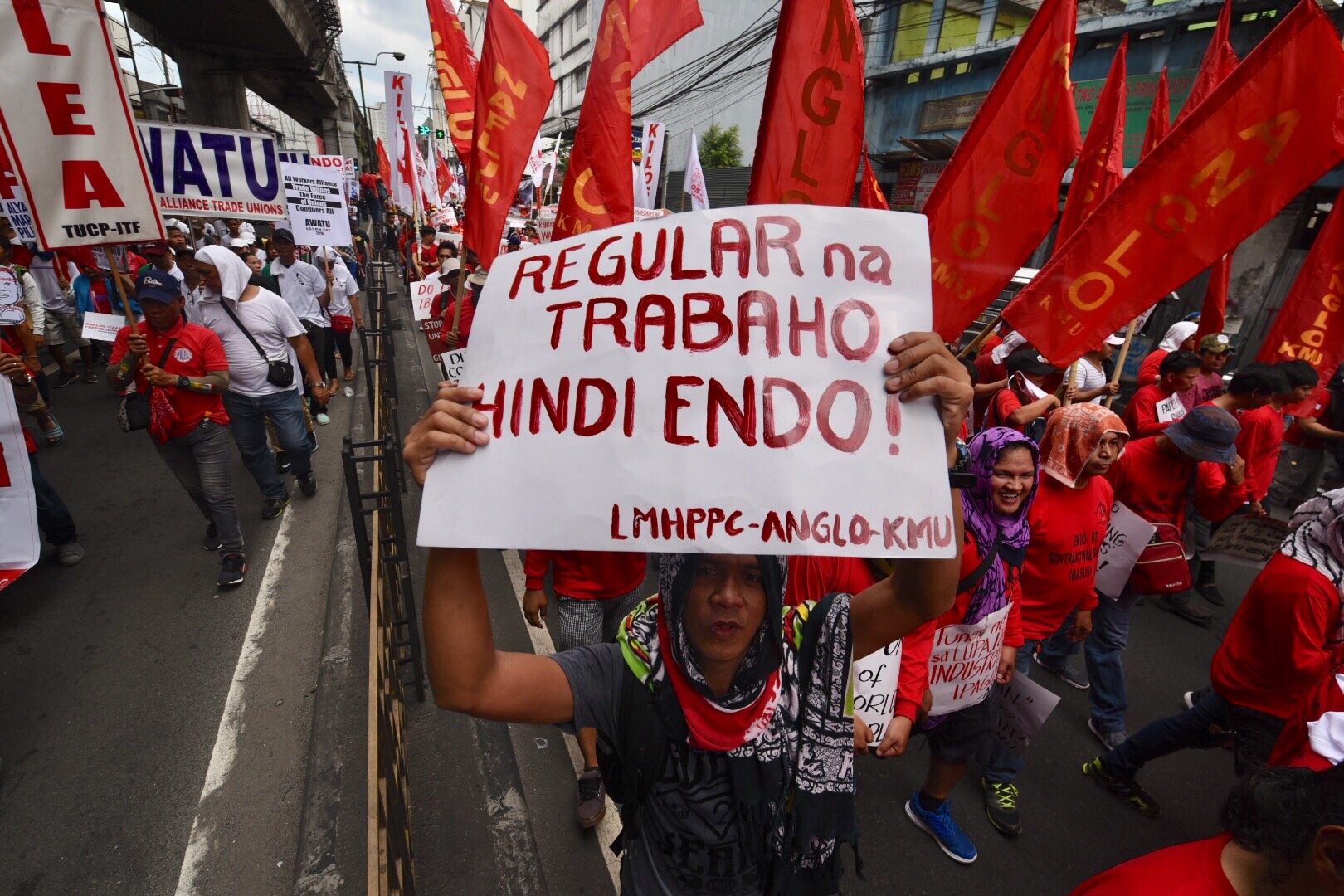SUMMARY
This is AI generated summarization, which may have errors. For context, always refer to the full article.

MANILA, Philippines – Workers on Wednesday, July 18, said that the Duterte administration’s policies against contractualization are “useless,” given continuing labor violations of companies.
Ahead of the 3rd State of the Nation Address, labor groups and union leaders from various industries convened in Manila to give a “State of the Workers Address.”
“Binabagyo ngayon ng iba’t ibang kilos protesta [si Duterte] dahil sa pagtalikod niya sa pag-iimplementa ng pangako niyang ibasura ang iskemang kontraktwalisasyon. Ito ang kinahinatnan ng malaganap na tanggalan,” said Kilusang Mayo Uno leader Bong Labog.
(Duterte is facing different protests because he did not implement his promise to junk contractualization schemes. This is the result of widespread layoffs.)
Labog also slammed the government’s “achievement” of regularizing more than 125,000 workers in 2017. He said that this figure is “very small” compared to the total number of contractual employees in the Philippines.
“Sabi ng gobyerno, nasa 100,000 na ang na-regular. Nasa’n ba ang 100,000 na ‘yan? Kung totoo man, 0.4% lang ito ng existing contractual labor na nasa 25 million,” he said, citing figures of the Trade Union Congress of the Philippines.
(The government said that around 100,000 have been regularized. Where are the 100,000? If that is true, it’s only 0.4% of the existing contractual labor that’s around 25 million.)
President Rodrigo Duterte signed Executive Order (EO) Number 51 prohibiting illegal contracting and subcontracting on Labor Day, after several postponements. But provisions of the EO, labor groups and lawmakers said, were already in DOLE Department Order 174 that set “stricter” guidelines for contractualization.
“Judging his track record, may inaasahan ba ang workers? Inaasahan namin wala. Maski ‘yang DO na ‘yan eh. Naglabas siya ng EO na wala ring kuwenta,” Labog said. (Judging by his track record, what can the workers expect? We are expecting nothing. Even that DO. He issued an EO that is equally useless.)
Given the recent events of “betraying” the trust of workers, Labog said labor groups are more united than ever.
“For the first time, we were able to come together and march as one during Labor Day. We will be witnessing the same [during SONA],” he said.
State of the workers
When Duterte postponed the signing of the EO in April, he ordered the Department of Labor and Employment (DOLE) to come up with a list of companies that engage in labor-only contracting.
This kind of contracting scheme is illegal, as services provided by the workers are key functions of its client’s company.
DOLE had flagged more than 3,300 companies engaged in labor-only contracting practices affecting more than 220,000 workers. Of these companies, Jollibee, Dole Philippines, and PLDT Incorporated topped the list.
DOLE ordered fast food giant Jollibee and telecommunications company PLDT to place 7,000 workers each in permanent positions. DOLE said Jollibee is still negotiating with the department, while thousands of PLDT workers under its contractors were laid off following the order.
Labor Secretary Silvestre Bello III had to issue a clarificatory order requiring PLDT to absorb the employees in regular positions “without conditions”, as the regularization order is final and executory.
Wage hike
Labor groups also called on the labor department to increase the minimum wage as prices of goods continue to increase.
They also said that the regional wage board should be abolished, and implement a P750-minimum-wage across the country.
They argued that it was the President’s promise to improve the living standards outside of the capital region, and one way is to implement a national minimum wage.
“He should do what he promised. Galing sa kanya ‘yan eh. (That came from him.) Before his election, he promised to end contractualization. We want to hear what he promised,” Labog said.
“We expect him to do what he promised – wages of workers in Metro Manila be of the same level in the regions. That’s why we’re asking for the implementation of a national minimum wage with the amount of P750 [which is] enough to sustain the family,” he added.
Inflation hit another new high at 5.2% in June. The government’s inflation target range for 2018 was between 2% and 4%.
With rising inflation rates, Associated Labor Unions-Trade Union Congress of the Philippines (ALU-TUCP) said it diminished the purchasing power of Filipino workers.
The Makabayan bloc in the House of Representatives filed a bill seeking a P750-daily national minimum wage for workers in May, and the abolition of RTWPBs.
Back in September 2016, Labor Secretary Silvestre Bello III said the government is considering a national minimum wage law which would adjust minimum salaries comparable to Metro Manila. (READ: Is it time for a national minimum wage?) – Rappler.com
Add a comment
How does this make you feel?





There are no comments yet. Add your comment to start the conversation.